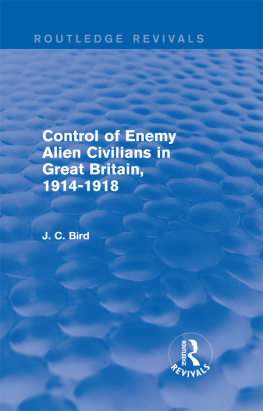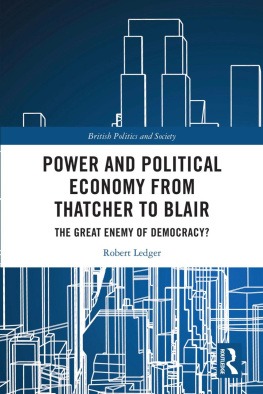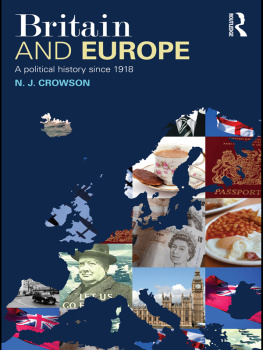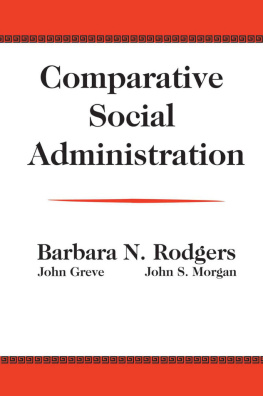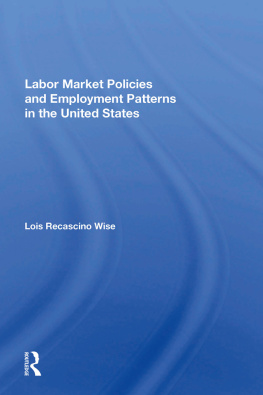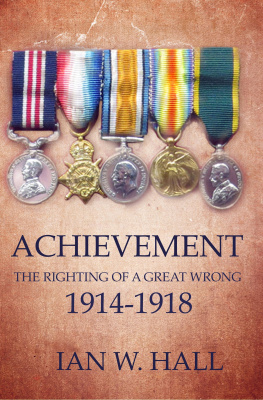Routledge Revivals
Control of Enemy Alien Civilians in Great Britain, 19141918
This study, first published in 1986, examines the evolution and application of the policies of wartime governments designed to deal with the danger to national security thought to be posed by enemy alien residents, and considers the social and political forces which helped shape these policies. The scope of the powers assumed by the authorities to regulate the entry, departure, movement, employment, business activities and many other facets of the lives of aliens were unprecedented in war or peace. This book will be of interest to students of history.
First published in 1986
by Garland Publishing Ltd
This edition first published in 2015 by Routledge
2 Park Square, Milton Park, Abingdon, Oxon, OX14 4RN
and by Routledge
711 Third Avenue, New York, NY 10017
Routledge is an imprint of the Taylor & Francis Group, an informa business
1986 John Clement Bird
The right of J. C. Bird to be identified as author of this work has been asserted by him in accordance with sections 77 and 78 of the Copyright, Designs and Patents Act 1988.
All rights reserved. No part of this book may be reprinted or reproduced or utilised in any form or by any electronic, mechanical, or other means, now known or hereafter invented, including photocopying and recording, or in any information storage or retrieval system, without permission in writing from the publishers.
Publishers Note
The publisher has gone to great lengths to ensure the quality of this reprint but points out that some imperfections in the original copies may be apparent.
Disclaimer
The publisher has made every effort to trace copyright holders and welcomes correspondence from those they have been unable to contact.
A Library of Congress record exists under LC control number: 86014217
ISBN 13: 978-1-138-85766-7 (hbk)
ISBN 13: 978-1-315-71849-1 (ebk)
Copyright 1986 by John Clement Bird
All rights reserved
Library of Congress Cataloging-in-Publication Data
Bird, J. C. (John Clement), 1933
Control of enemy alien civilians in Great Britain,
19141918.
(Outstanding theses from the London School of
Economics and Political Science)
Bibliography: p.
1. AliensGreat BritainHistory. 2. Concentration
campsGreat BritainHistory. 3. World War, 19141918
Great Britain. I. Title. II. Series.
KD4130.B57 1986 323.6310941 86-14217
ISBN 0-8240-1910-5
All volumes in this series are printed
on acid-free, 250-year-life paper.
Printed in the United States of America
Control of Enemy Alien Civilians in Great Britain 19141918
J. C. Bird
Contents
| AP | Asquith Papers |
| ARA | Aliens Restriction Act |
| ARO | Aliens Restriction Order |
| CAB | Cabinet |
| CID | Committee of Imperial Defence |
| DORA | Defence of the Realm Act |
| HC | House of Commons |
| HL | House of Lords |
| HO | Home Office |
| HOR | Records held at the Home Office |
| KP | Kitchener Papers |
| PP | Parliamentary Papers |
| SO | Scottish Office |
| SP | Simon Papers |
| WO | War office |
This study of the way in which Great Britain dealt with its enemy alien population during the First World War is based primarily on material held at the Public Record Office and the Home Office, Hansard reports of parliamentary debates and official publications. Contemporary newspapers and periodicals also proved helpful, particularly as an indication of popular reaction to government policies, or sometimes lack of them, but relatively modest returns were derived from private papers of politicians involved in the events discussed, or from memoirs, biographical material and secondary sources.
In thanking the many individuals and institutions who helped me during my research I would first like to record my gratitude to Professor James B. Joll, Emeritus Professor of International History in the University of London, for his unfailingly wise counsel and encouragement.
As a Home office civil servant during the early period of my research, I am pleased to acknowledge the kind help and advice provided by a number of colleagues, particularly staff of the library and the departmental records office. I am also grateful to Mr W.R. Perks, CBE, and Mr C.J.P. Ruck, CBE, both retired Chief Inspectors of Immigration, and to Mr J.M. Ross, CBE, former head of the Nationality Department, for our interesting and valuable discussions about aliens controls and nationality regulations during and since the First World War. Mr Ross, whose unpublished study, A History of Naturalisation 1252-1970 (1970), proved a rich source of information on a rather neglected topic, was kind enough to read and comment on my chapter on nationality and citizenship. I am also indebted to Mrs Henrietta Roche for permission to read some of the papers of her late husband, Mr T.W.E. Roche, a former member of the Immigration inspectorate and author of The Key in the Lock: immigration Control in England from 1066 to the Present Day (1969).
I must acknowledge the assistance given by librarians and archivists at the Universities of London and Birmingham; the British Library of Political and Economic science; the Bodleian Library, Oxford; Churchill College, Cambridge; the British Library Newspaper Library; the Institute of Historical Research; the Ministry of Defence; the Imperial war Museum, and the Royal united Services Institution. I am grateful for permission to consult private papers held at some of these institutions. Similarly my thanks are due to the Keeper of the Public Records and the Controller of Her Majestys Stationery Office for the use of material in the Public Records Office and in official publications.
Finally I must thank my wife and family for their forbearance and support during a period in which they were entitled to much more of my time and attention than they received.
In the vast corpus of scholarship devoted to Great Britains involvement in the First world War one of the more intriguing issues of domestic policy which has previously attracted little more than cursory attention from historians is the treatment of the small minority of the population - estimated at between 70,000 and 75,000, excluding British-born women and children under the age of 14 - who found themselves classified as enemy aliens.
This study examines the evolution and application of the policies of wartime governments designed to deal with the danger to national security thought to be posed by enemy alien residents, and considers the social and political forces which helped shape those policies. The scope of the powers assumed by the authorities to regulate the entry, departure, movement, employment, business activities and many other facets of the lives of aliens were unprecedented in war or peace.
Many of the enemy nationals living in Great Britain when the war began had been domiciled in the country for decades, some since infancy, had British-born wives (who through marriage also acquired enemy nationality) and children, and retained few, if any, ties with the state to which they nominally owed allegiance. Their failure to obtain British nationality before the war, undoubtedly in many cases because there seemed no compelling practical reasons for doing so, was for many to have harsh and far reaching consequences. They were to become subject to a level of parliamentary attention, press coverage and popular controversy out of all proportion to their numbers and their potential threat to the state. And they were to face internment, repatriation, restrictions on their civil rights infinitely more severe than those imposed on the general population, and become the target of vilification, harassment and sometimes violence. The popular suspicion that the enemy alien population was dedicated to the disruption of the British war effort and the provision of clandestine assistance to the enemy helped give rise to the remarkably virulent spy mania which gripped the country, particularly during the early period of the war.

